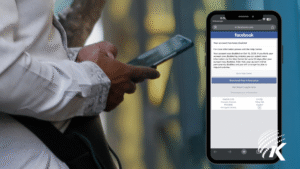Digital security experts are urging Facebook users and page owners to strengthen account protection as cases of disabled profiles and lost access surge nationwide, warning against fake recovery services and advising users to save account details, use trusted devices and assign backup administrators to prevent permanent loss.
Digital security experts have warned Cambodian Facebook users and page owners to take urgent steps to secure their accounts, as reports of disabled profiles and lost access continue to rise across the country.
Digital Security Consultant, Ngeth Moses, advised users to immediately save their Facebook profile URL or address to make it easier to verify ownership if they are locked out. “Someone lost their account and didn’t know their Facebook URL or didn’t save it. Now, you should save your Facebook address,” he said.
Moses added that there is currently no direct way to contact Facebook Support, and account disabling cases “continue without being able to recover them”. “I hope those who disabled their accounts will recover them soon, stay calm,” he added.
Moses also warned users not to trust individuals or services that claim to restore Facebook accounts, stressing that only Facebook can recover them.
“Please be careful with services that promise to recover your account. A legitimate service provider will never ask for your email or password,” he said. “Be careful about giving money to someone before you get results.”
According to Moses, all legitimate communications from Facebook Support include a case number, and any recovery calls should go to the user’s individual phone number. For those who do not speak English, he suggested requesting that Facebook use an appropriate communication method.
He outlined key information required for account recovery:
- Facebook account address
- Email address linked to the account
- Phone number
- Device used to access the account (phone or computer model)
- Actions taken before the account was disabled
- Screenshots or other supporting evidence
Moses also advised victims not to share passwords, as Facebook never asks for password, and not to reset or change devices linked to their account, as they could be needed for verification.
He noted reports of accounts being disabled after sharing certain pages or connecting to Wi-Fi in specific areas, urging affected users to report their experiences directly. Some cases can be recovered; however, most cases cannot and are permanently disabled.
Moses said in the early years, Facebook ran campaigns to combat spam accounts and comments. From his point of view, he said that accounts that have the subscription Meta Blue Verification might search for accounts and send information to Meta support, and see if they are being recovered.
“Meta Support only monitors accounts that can either be fixed or permanently disabled. There are two outcomes: if eligible, the account will be fixed; if not, it will be permanently disabled,” he added.

Facebook page owners face growing risks
Another online security expert, Sophat Chy, said the rise in account closures has also hit Facebook page owners, who risk losing access to pages and followers when the main administrator’s account is disabled.
“After many accounts are closed, many pages also lose followers or engagement. This problem not only affects personal users but also businesses that rely on Facebook for advertising and customer communication,” Sophat said.
He explained that when an account is disabled, connected pages often stop posting automatically, lose visibility in newsfeeds, or face restrictions on live broadcasts and promotions.
Causes and prevention
Sophat highlighted several reasons behind page and follower losses:
- Disabled or restricted owner accounts halt page activity
- Facebook’s algorithm reduces visibility for pages linked to problematic accounts
- Fake account recovery services trick users into sharing login details
- Repeated logins or device changes trigger Facebook’s security blocks
He added, “Only Facebook can recover your account. Do not share your email or password with anyone. Legitimate support will never ask for payment in advance.”
To reduce risks, he advised users to:
- Save the account URL, email and phone number linked to Facebook
- Keep screenshots or profile data as proof
- Use the same device previously used for logins when contacting Facebook Support
- Avoid switching phones or SIM cards during recovery
- Assign more than one page administrator to prevent total loss of access
“Keeping a backup admin is very important for page and business security,” Sophat said. “If you lose access, stay calm and avoid creating a new account right away.”
He also warned users not to create new Facebook accounts on the same device used for a disabled account, as Facebook’s system can detect the link and impose further restrictions.
Sophat and his colleagues are now collecting user reports on account closures to better understand the problem and share verified findings with relevant teams. “We’ve seen people spend thousands of dollars on fake recovery offers. Please don’t rush to contact unofficial services or hand over your details to strangers.”

According to Facebook policy, if an account is suspended or disabled and the owner does not appeal within 180 days, or if an appeal is unsuccessful, the account will be permanently disabled, and the user cannot appeal against this decision.
Meta may also disable an account without suspending it first, such as in cases of severe or time-sensitive violations. Some examples of why an account might be suspended or disabled include:
- Posting content that doesn’t follow Meta Community Standards
- Misrepresenting your identity to mislead or deceive others, evade enforcement or violate the Community Standards, including impersonating someone
- Contacting other people for the purpose of harassment, advertising, promoting or other conduct that is not allowed
If the owner’s account was disabled by mistake on Facebook, the user can submit more information via the Help Centre for up to 30 days after the account was disabled. After that, the account will be permanently disabled and the owner will no longer be able to request a review.
